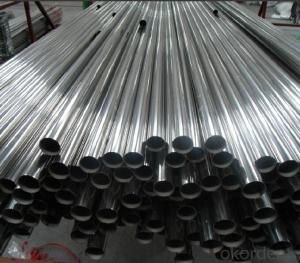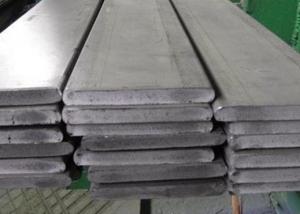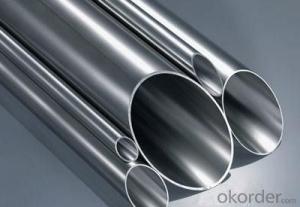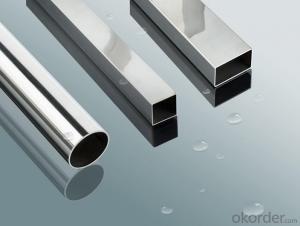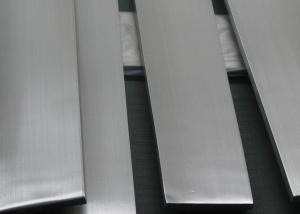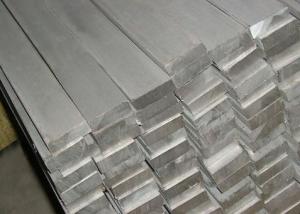Stainless Seamless Steel Pipes With Good Price
- Loading Port:
- China main port
- Payment Terms:
- TT or LC
- Min Order Qty:
- 100 m.t.
- Supply Capability:
- 10000 m.t./month
OKorder Service Pledge
OKorder Financial Service
You Might Also Like
1、Structure of Seamless Pipe :
Seamless pipe is formed by drawing a solid billet over a piercing rod to create the hollow shell. As the manufacturing process does not include any welding, seamless pipes are perceived to be stronger and more reliable.
2、Main Features of the Seamless Pipe :
• Small inertia resistance
• Strong heat dissipation ability
• Good visual effect
• Reasonable price
• High manufacturing accuracy
• High strength
3、Seamless Pipe ASTM A106/53 Specification:
Standard | GB, DIN, ASTM ASTM A106-2006, ASTM A53-2007 |
Grade | 10#-45#, 16Mn 10#, 20#, 45#, 16Mn |
Thickness | 8 - 33 mm |
Section Shape | Round |
Outer Diameter | 133 - 219 mm |
Place of Origin | Shandong, China (Mainland) |
Secondary Or Not | Non-secondary |
Application | Hydraulic Pipe |
Technique | Cold Drawn |
Certification | API |
Surface Treatment | factory state or painted black |
Special Pipe | API Pipe |
Alloy Or Not | Non-alloy |
Length | 5-12M |
Outer Diameter | 21.3-610mm |
Grade | 20#, 45#, Q345, API J55, API K55, API L80, API N80, API P110, A53B |
Standard | ASME, ASTM |
1) Material:20#(ASTM A 106/A53 GRB.API5LGRB,GB),45#,16Mn,10#.
2) Specification range:OD:21.3-610mm,WT:6-70mm,length:6-12m or according to the requirement of clients.
3) Surface:black lacquered,varnish coating or galvanized.
4) Ends:Beveled or square cut,plastic capped,painted.
5) Packing:bundles wrapped with strong steel strip,seaworthy packing.
4、Packaging & Delivery
Packaging Details: | seaworthy package,bundles wrapped with strong steel strip |
Delivery Detail: | 15-30days after received 30%TT |
5、FAQ of Seamless Pipe :
①How is the quality of your products?
If you want see our quality certifications and all kinds of testing report, please just ask us for it.
Guaranteed: If products’ quality don’t accord to discription as we give or the promise before you place order, we promise 100% refund.
②How about price?
Yes, we are factory and be able to give you lowest price below market one, and we have a policy that “ for saving time and absolutely honest business attitude, we quote as lowest as possible for any customer, and discount can be given according to quantity”,if you like bargain and factory price is not low enough as you think, just don’t waste your time.Please trust the quotation we would give you, it is professional one.
③Why should you chose us?
Chose happens because of quality, then price, We can give you both.Additionally, we can also offer professional products inquiry, products knowledge train(for agents), smooth goods delivery, exellent customer solution proposals.Our service formula: good quality+good price+good service=customer’s trust
Any question, pls feel free to contact us !
6、Seamless Pipe ASTM A106/53 Images:
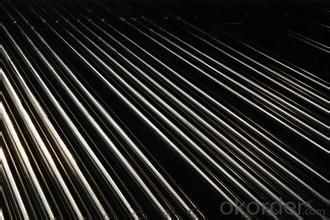
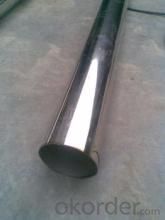
- Q:Can stainless steel pipes be used for heat recovery systems?
- Yes, stainless steel pipes can be used for heat recovery systems. Stainless steel is a popular choice for heat recovery systems due to its excellent heat resistance and corrosion resistance properties. It can withstand high temperatures without warping or deteriorating, making it suitable for transferring heat from one medium to another. Additionally, stainless steel pipes have a long lifespan and require minimal maintenance, making them a durable and cost-effective option for heat recovery systems.
- Q:Can stainless steel pipes handle acidic or alkaline fluids?
- Yes, stainless steel pipes can handle both acidic and alkaline fluids. Stainless steel is known for its excellent corrosion resistance, which makes it highly suitable for handling aggressive substances. It contains chromium, which reacts with oxygen to form a thin protective layer on the surface of the steel, preventing further corrosion. This passive layer is stable in both acidic and alkaline environments, providing long-term protection against corrosive fluids. However, the corrosion resistance can vary depending on the specific grade of stainless steel used and the concentration and temperature of the fluids being transported. It is important to select the appropriate grade of stainless steel and consider factors such as temperature, concentration, and potential exposure to other corrosive substances when choosing stainless steel pipes for handling acidic or alkaline fluids.
- Q:Can stainless steel pipes be used for pharmaceutical manufacturing?
- Yes, stainless steel pipes can be used for pharmaceutical manufacturing. Stainless steel is a commonly used material in the pharmaceutical industry due to its excellent corrosion resistance, high strength, and ease of sterilization. It is suitable for transporting various pharmaceutical fluids and gases while ensuring cleanliness, safety, and compliance with industry regulations.
- Q:What are the common industry standards for stainless steel pipes?
- The common industry standards for stainless steel pipes include ASTM A312/A312M for seamless and welded pipes, ASTM A269 for seamless and welded tubes, and ASME B36.19M for stainless steel pipe dimensions. These standards ensure the quality, dimensions, and performance of stainless steel pipes in various applications.
- Q:Can stainless steel pipes be used for irrigation sprinkler systems?
- Yes, stainless steel pipes can be used for irrigation sprinkler systems. Stainless steel is highly resistant to corrosion and rust, making it a durable choice for outdoor applications like irrigation systems. Additionally, stainless steel pipes have excellent strength and can withstand high-pressure conditions, making them suitable for sprinkler systems.
- Q:Can stainless steel pipes be used for exhaust systems?
- Indeed, exhaust systems can utilize stainless steel pipes. Stainless steel, renowned for its exceptional resistance to both corrosion and heat, is a favored material for exhaust systems. It possesses the ability to withstand the severe temperatures and harsh circumstances to which exhaust systems are exposed, rendering it an enduring and long-lasting alternative. An added benefit of stainless steel pipes is their lightweight nature, which can enhance the performance of the exhaust system. Furthermore, stainless steel pipes can be effortlessly manipulated and molded, allowing for tailor-made adaptations to suit various vehicle models and configurations. All in all, stainless steel pipes present a dependable choice for exhaust systems, guaranteeing outstanding performance and longevity.
- Q:Are stainless steel pipes suitable for chemical processing plants?
- Chemical processing plants find stainless steel pipes highly suitable. Their excellent corrosion resistance properties make them an ideal choice for handling various chemicals and corrosive substances. They can resist both organic and inorganic chemicals, acids, and alkalis, ensuring the pipes' integrity and longevity in harsh chemical environments. Furthermore, stainless steel pipes offer high strength and durability, enabling them to withstand the high pressures and temperatures commonly found in chemical processing plants. They exhibit excellent heat resistance, which is crucial for handling hot fluids and maintaining chemical process stability. In addition, stainless steel pipes have low maintenance requirements and are easy to clean, reducing contamination risks and ensuring chemical purity. They are also resistant to scaling, which can affect plant operations' efficiency. Moreover, stainless steel pipes are non-reactive, meaning they do not leach or contaminate the transported chemicals. This quality is particularly important in chemical processing plants where product purity and quality are paramount. All in all, stainless steel pipes provide a reliable and efficient solution for chemical processing plants due to their exceptional corrosion resistance, strength, durability, heat resistance, and non-reactivity.
- Q:Can stainless steel pipes be used in nuclear power plants?
- Yes, stainless steel pipes can be used in nuclear power plants. Stainless steel is often used in the construction of nuclear power plants due to its excellent corrosion resistance, high strength, and ability to withstand high temperatures. It is particularly suitable for applications involving the transport of coolant, steam, and other fluids within the plant.
- Q:What is the difference between annealed and pickled stainless steel pipes?
- Annealed stainless steel pipes and pickled stainless steel pipes both undergo different processes that affect their properties and appearance. Annealing is a heat treatment process that involves heating the stainless steel pipes to a specific temperature and then slowly cooling them. This process helps to relieve internal stresses and improve the ductility and toughness of the material. Annealed stainless steel pipes are usually softer and more malleable, making them easier to work with during fabrication and installation. They also tend to have a smoother, more polished surface finish. On the other hand, pickling is a chemical process that removes surface impurities such as oxides, scales, and rust from stainless steel pipes. It involves immersing the pipes in an acid solution, typically a mixture of nitric and hydrofluoric acid, which dissolves the impurities. Pickling helps to restore the corrosion resistance of the stainless steel and leaves a clean, bright, and uniform surface finish. In summary, the main difference between annealed and pickled stainless steel pipes lies in the processes they undergo. Annealing improves the material's ductility and toughness, while pickling removes surface impurities and restores corrosion resistance. The choice between annealed and pickled stainless steel pipes depends on the specific requirements of the application, such as the desired mechanical properties and surface finish.
- Q:How can the inner walls of stainless steel tubes be polished?
- Electropolishing is thrown to the workpiece as anode, insoluble metal poles at the same time as the cathode, immersed into electrolytic cell, with the direct current produced anodic dissolution selectively, so as to achieve the surface brightness increasing effect. Specific can be used to search "what is electrolytic polishing" can understand!
1. Manufacturer Overview |
|
|---|---|
| Location | |
| Year Established | |
| Annual Output Value | |
| Main Markets | |
| Company Certifications | |
2. Manufacturer Certificates |
|
|---|---|
| a) Certification Name | |
| Range | |
| Reference | |
| Validity Period | |
3. Manufacturer Capability |
|
|---|---|
| a)Trade Capacity | |
| Nearest Port | |
| Export Percentage | |
| No.of Employees in Trade Department | |
| Language Spoken: | |
| b)Factory Information | |
| Factory Size: | |
| No. of Production Lines | |
| Contract Manufacturing | |
| Product Price Range | |
Send your message to us
Stainless Seamless Steel Pipes With Good Price
- Loading Port:
- China main port
- Payment Terms:
- TT or LC
- Min Order Qty:
- 100 m.t.
- Supply Capability:
- 10000 m.t./month
OKorder Service Pledge
OKorder Financial Service
Similar products
New products
Hot products
Hot Searches
Related keywords
